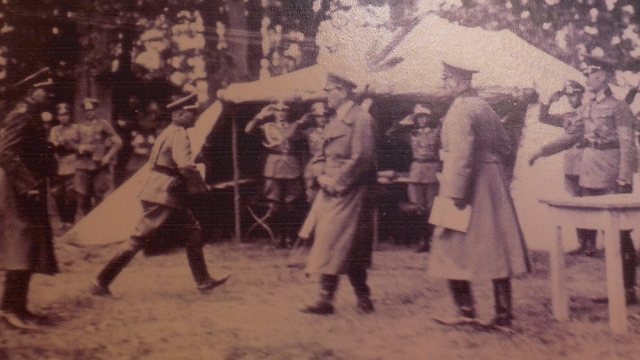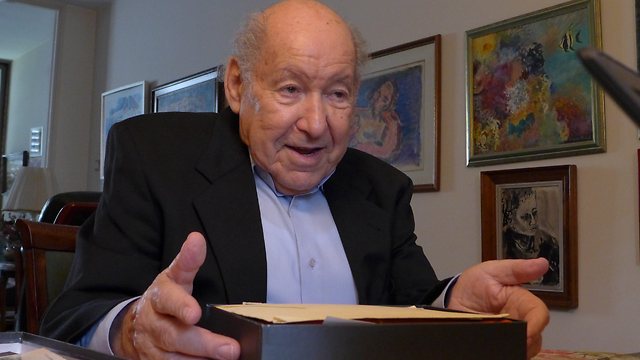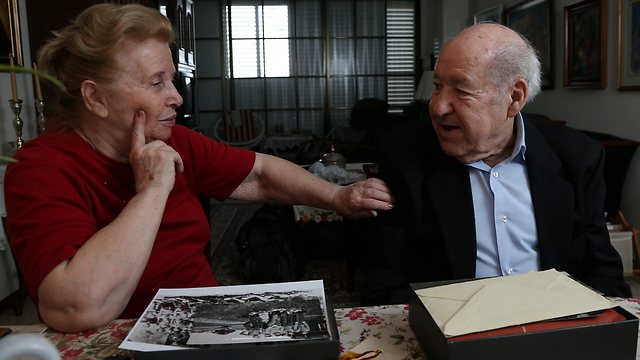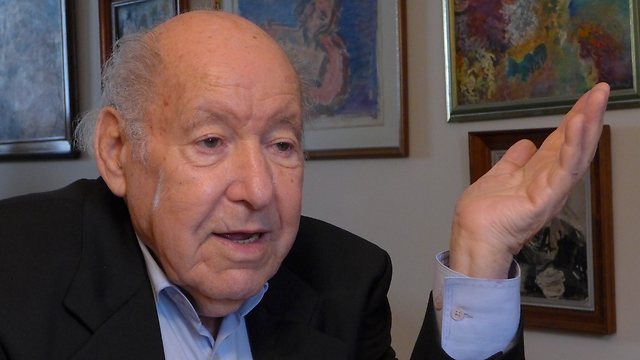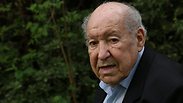
Shlomo Perel rummages through a cardboard box, finds the photo he was looking for and says dryly: "Here, that's Hitler. I photographed him with my Aqua camera from 50-70 meters away. I looked him in the eye. I was 16 years old then, a translator in the German army, with uniforms and a swastika, and I didn't know who I was at all."
Perel, who will be turning 90 years old in two weeks, will light a torch at the Holocaust Remembrance Day state memorial service at Massuah Institute for Holocaust Studies in Tel Yitzhak. This year's ceremony's theme is children who were saved after taking on a borrowed identity, and for Perel this would be like coming full circle.
"For years I've been told, both to my face and behind my back, that I'm not a classic Holocaust story because I wasn't at a ghetto or a camp, I received education and pocket money and plenty of food. Someone told me once: 'Your Holocaust is a Deluxe Holocaust'. But he could not imagine the fear I lived with every day and what I did, just so I wouldn't get found out."
"Pogroms started, my parents had a shoe store and residents were forbidden from buying from Jews," he recalls.
"When Germany invaded Poland, the Jews were ordered to enter the Lodz Ghetto, and my parents realized this is a place you enter alive, but you don't know how you come out. So they sent me, a 14-year-old teenager, and my 30-year-old brother Isaak, to (the Soviet-controlled) eastern Poland.
"Before we left my father told me in Yiddish: 'Don't ever forget who you are.' Meaning, 'Stay a Jew.' Mother added in Yiddish: 'Go, you must live.' When a mother sends her children away knowing she'll never see them again - that's the greatest love of all."
The Führer at close range
The two brothers crossed the border, with the elder sibling going to his acquaintance in Vilna, while Perel found shelter at a Jewish orphanage in Grodno.
"At the morning of the German invasion to the Soviet Union, all of the children were woken up and told to escape east. I arrived with the fleeing masses to the outskirts of Minsk. The German surrounded us in an open field and ordered us to stand in a line, and then it was my turn. The German soldier who stood in front of me ordered me to put my hands up and asked: 'Are you a Jew?'"
That was a pivotal moment in Perel's life. "I knew that if I told the truth, I'd be facing immediate death and I had to choose between my father who told me 'always stay a Jew' and my mother who told me 'you must live'. Luckily, mother's voice prevailed and I said: 'No, I'm German'.
"And then a miracle happened - for some reason he believed me. All of the men had to pull down their pants and those found circumcised were executed, but not only did that soldier not order me to take off my clothes, he called me a 'Volksdeutscher' (an ethnic German living outside Germany).
"He brought me to his unit, where a senior office took a liking to me and appointed me a Russian and Polish translator - a role I had for nine months."
During that time, Hitler came to visit the frontlines. "Only the high-ranked generals approached him and were allowed past his wall of bodyguards. I was hiding with a camera," Perel says.
"After the war, I was asked many times: 'Why did you photograph Hitler instead of killing him?' And I tell the truth: Had I shot Hitler, I'm not sure I would've hit him, but I would've surely been killed on the spot. And I didn't want to get into the history pages as a hero, I preferred being an anti-hero and survive."
Does this question anger you?
"Not anymore. People can't understand the situation I was in. When I was looking at my chest, I saw a swastika, but in my head I remembered I was a Jew whose father ordered him to stay a Jew and whose mother ordered him to live. I didn't know who I was at all.
"When talking about the Holocaust, there's a clear division: The victims were Jews, and the perpetrators were the Nazis, while I was both. From the moment I wore the uniforms with a swastika on, I became my own enemy and I had to escape myself to survive."
How did you manage to hide the fact you were circumcised?
"I found all sorts of ways to avoid medical examinations, and I always entered the shower stall closest to the wall so no one could see me.
"But I was sexually abused. An army doctor had his eye on me and one of the nights, when I entered the shower after everyone left, he surprised me from behind and tried to rape me. I fought him with all of my strength until I managed to free myself from his grasp. When I turned around he found out I was circumcised. He was surprised and said: 'You're a Jew!' I was sure this was the end for me, but he said: 'Know that there is also a different kind of Germans.'
"He didn't inform on me so as to not expose himself as a homosexual. I knew his secret and he knew mine, and after that incident he took care of me until he was killed."
Later on, Perel was sent to a Hitler Youth school in Braunschweig.
"For three and a half years I studied Supremacism and developed defense mechanisms which made me forget that I was a Jew," he says.
"I changed my name to Josef, the Germans called me Jupp, and as the days went by, the lie turned into a reality. I felt like any other Hitler Youth and I was so convinced, that no one suspected I wasn't. I stopped eating kosher and believing in God, but I believed I'll stay alive. I felt immortal, like 'it won't happen to me.'"
During these years, two identities were fighting for control over Perel's body - Shlomo and Josef.
"I was schizophrenic. During the day, I was a German youth who wanted to win the war, I sang songs against Jews and yelled 'Heil Hitler' - and at night, in bed, I cried out of longing for my family, and performed all sorts of 'operations' on myself to survive. I tried to pull on my foreskin and wrapped it with a tight elastic dressing, in the hopes that if I did that every night, despite of the pain, the skin would stretch and it won't show that I'm circumcised.
"My second enemy was dreaming. When you're awake, you can control what you say, but during a dream you could cry out something about mother and father, and a roommate can hear you."
In the winter of 1943, wearing his Hitler Youth uniforms, he took the tram through the Lodz Ghetto, "and this was the first time I saw the horrors. It was only after the war that I learned mother was killed in a sealed truck, with the gas from the engine entering the cabin and people suffocating during the drive. She has no grave. Father died two weeks after the army entered Lodz from exhaustion, disease and starvation, and he was buried in the Jewish cemetery there."
And how did the war end for you?
"Hitler issued an order that 'all of the Hitler Youths must take arms, to defend the homeland,' and I was sent to the front with a Bazooka in hand. I was guarding, along with other 20 year olds like me, the bridge of a freeway. When the American army came, I was taken hostage, but the lie was so deeply ingrained within me that I didn't even tell the Americans I was a Jew. I sat in captivity like everyone else, but for me it was a surreal situation: A Jewish youth wearing a Nazi Army uniform in American captivity."
Perel and the other Hitler Youths were freed after a few days, as the group was not recognized as war criminals.
"And for me, it was all over. I was free. But what do you do with this freedom? Who am I, anyway? The next day I met two people identifying as Jews returning from Bergen-Belsen. I asked them what that was and they pointed at the concentration camp that was not far from there. I was in shock. I've lived here for years, had fun with women, and right under my nose were the extermination trains. It was a full-on confrontation of both of my identities, Shlomo and Josef."
A meeting with the executioner
Perel went to Bergen-Belsen ("a pile of dead bodies, awful smell"), and then continued to Munich to meet his brother Isaak, who was transferred to the Vilna Ghetto and survived Dachau. After that, Shlomo moved to Palestine and joined the Hagannah.
"I went on a ship to the besieged Jerusalem and fought in the War of Independence as a Jew, as Shlomo Perel."
In Tel Aviv he met Devorah, a Pole who was exiled to Siberia, and together they have two sons. After undergoing heart surgery, he started writing his memoirs. "I Was Hitler Youth Salomon" is the name of his book, which was later adapted in the 1990 movie "Europa Europa".
"A German judges panel refused to submit (the movie) to the Oscars, claiming it wasn't a documentary," he says.
"They dared suspect my story was fiction. So I went to Germany with an Israeli journalist, we located friends of mine from the Hitler Youth school and they confirmed that for three and a half years, they did not suspect I was a Jew. We also managed to locate the German soldier who believed I was German and saved my life. I asked him why he did it, and he said: 'An internal voice told me to believe you.' I felt ambivalent about him, he could've been my executioner, but on the other hand he saved me. I forgave him when I saw how much he did after the war for the Jewish community left in Lübeck, and I even had him at my house in Givatayim."
Did you give Yad Vashem the original photograph of Hitler?
"No. I gave them the Supremacism school books that remained in my possession. The original photo, which stayed with me for dozens of years, I kept at home until they opened the Holocaust museum in Washington and president Ronald Reagan invited me to attend the grand opening. I'm almost never invited to Jerusalem. I feel like I'm being ignored because I'm not a typical Holocaust story. But Roy, the youngest of my three grandchildren, will light the torch on Holocaust Remembrance Day with me. He's a little after his Bar Mitzvah, and he knows that at his age, I made up a German identity to stay alive."














